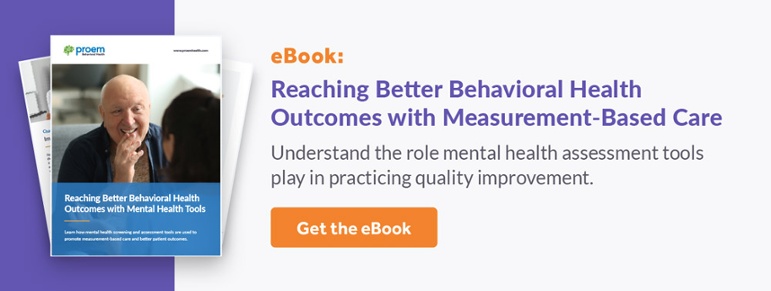In late 2023, the American College of Obstetricians and Gynecologists (ACOG) released new recommendations calling for multiple depression screenings throughout pregnancy and during the postpartum period. In the following Q&A with Thomas Young, MD, chief medical officer of Proem Behavioral Health, Dr. Young discusses what to know about the new recommendations. He also speaks to the U.S. Food and Drug Administration's (FDA) recent approval of Zurzuvae (zuranolone), a medication for treating postpartum depression, and what providers should know before prescribing the drug.


Q: What do you think about the new ACOG depression screening recommendations?
Dr. Thomas Young (TY): ACOG recommends that screening should occur at least three times during pregnancy. I believe there's a more reasonable approach that should be considered. Think about how obstetrical visits go in terms of the pregnancy schedule. Most women get diagnosed with being pregnant somewhere between 10 and 12 weeks. At that point, the pregnant woman typically begins to meet with an obstetrician monthly. As you get closer to term, you start reducing the time between visits. By the time pregnancy nears 40 weeks, the woman is usually coming in weekly.
The reality is that we should probably screen not only for depression but all behavioral health disorders at every visit. It's easy to do so with no downside. I think and hope what will eventually happen is that part of the routine visit to an obstetrician will include getting screened for behavioral health disorders.
Q: Why do you think regular screening is imperative?
TY: To answer that, it's helpful to know that I'm starting to get away from the concept of "mental illness" and talking instead about "brain health." We talk about physical health, so let's start talking about brain health. We worry about one's physical health, so we're going to worry about one's brain health.
Which brings me to my next point concerning the term "behavioral health disorders." These are not disorders. These are diseases. Using the term "disorders" in the mental health space stigmatizes it right off the bat. It's a disease just like any other disease. We need to talk about brain health disease rather than mental illness and disorders.
The reality is everybody that meets with a provider for a chronic disease or condition — and pregnancy is a chronic condition — should have their brain health screened. I was a very active
obstetrician and delivered around 400 kids. I look back and realize I should have been focusing on my patients' brain health as well, but back then we didn't know what we know now.
If I were still practicing obstetrics, I would conduct a general brain health screening during my initial evaluation of a pregnant woman. That would tell me whether this person has an underlying brain health disease. From there, I would be looking for symptomatology of depression along the way. I would move from the regular screening tool, used during the initial visit, to the Edinburgh Postnatal Depression Scales (EPDS) screening tool, which is included in the Proem platform, and use that at every subsequent visit.
There are a couple of reasons why I would move to this schedule. If we start screening early, discover a pregnant woman has depressive symptomatology or starts developing symptomatology, we can start treating them earlier, and start treating them with medications we know are safe for pregnant women and non-addictive. These are selective serotonin reuptake inhibitors (SSRIs) and serotonin and norepinephrine reuptake inhibitors (SNRIs).
The big rub when you start talking about medications is if somebody is diagnosed with postpartum depression, the effects are disastrous, and they're disastrous quickly. The challenge with standard drugs like SSRIs and SNRIs is they may take four to six weeks to really kick in.
By screening earlier and regularly, we're building in time at the front end. Consider the nine-month pregnancy window and then the postpartum period. A significant number of pregnant women who develop postpartum depression develop depressive symptomatology inside the nine-month window, which is when I have built-in time to use standard SSRIs or SNRIs. Depressive symptomatology typically develops gradually. Rarely does it go from zero to very high the day after delivery. By identifying depressive symptomatology earlier and then turning to SSRIs or SNRIs, I reduce the number of people who may have accelerating symptomatology.
Q: Why are the pregnancy depression screening guidelines changing now?
TY: What's seemingly happened is people suddenly woke up and discovered that pregnant women get depressed. We didn't really recognize this disease of depression during pregnancy because we weren't looking for it. We only found it when it got very bad.
We know that brain health abnormalities occur during pregnancy. We do a lot for the physical health of pregnant women. We should do as much as we can for their brain health as well. Tracking brain health should become a standard part of the tracking mechanism for pregnancy.
Another contributing factor to why I believe the guidelines are changing is once we have a cure for a disease, we tend to look at the disease differently. That's what I think has happened here with zuranolone.
Q: What should we know about zuranolone?
TY: Zuranolone is a neurosteroid and the first oral medication indicated to treat postpartum depression. Before I discuss zuranolone further, it's important to note that there's already a neurosteroid in the market for postpartum depression. Brexanolone is an infusion that's been demonstrated to successfully treat postpartum depression. It was approved in March 2019
Zuranolone is essentially the pill version of brexanolone. It's a 14-day course that can start to deliver improvements within three days and usually by two weeks instead of four to six weeks for the drug in the standard SSRI to kick in.
Zuranolone has a role for that pregnant woman who may be acutely depressed or becomes acutely depressed in the last four weeks of the pregnancy. It's great for that sliver of people and may reduce the number of bad outcomes where women injure their newborns or commit suicide.
However, we have yet to see comparison studies of zuranolone against the appropriate use of SSRIs or SNRIs in pregnant women. Are outcomes any different six weeks after delivery? We don't know that yet.
There have also not been any completed studies showing what happens if you screen for depression early and regularly, identify symptomatology, and then start an SSRI at four, five, six or seven months out.
Q: What do you believe is the best solution for addressing the challenge of pregnancy and postpartum depression?
TY: If we really wanted to win at this game, the safest solution would be to have every pregnant woman start on an SSRI at seven months of pregnancy. We're not quite there yet, so we should instead be screening brain health frequently as part of routine care to encourage the use of safe, beneficial drugs.
We assess physical health at the time of conception so we should assess brain health at the time of conception. Then both should be part of assessing the woman's overall health during pregnancy. Let's find any brain disease that exists as early as we can and treat the disease early. If we miss a diagnosis or somebody develops depression late, we have a different option for treatment.
If we can get doctors to view and talk about physical and brain health the same way, it will become easier to make screening for a multitude of different brain diseases — e.g., depression, anxiety, eating disorders, substance abuse diseases — a routine part of care. That would be great for pregnant women and the obstetricians taking care of them.
Proem can help with an intelligent behavioral health workflow engine that helps providers proactively screen patients, use actionable data to make better decisions, and ultimately help patients lead healthier lives.





.png)









